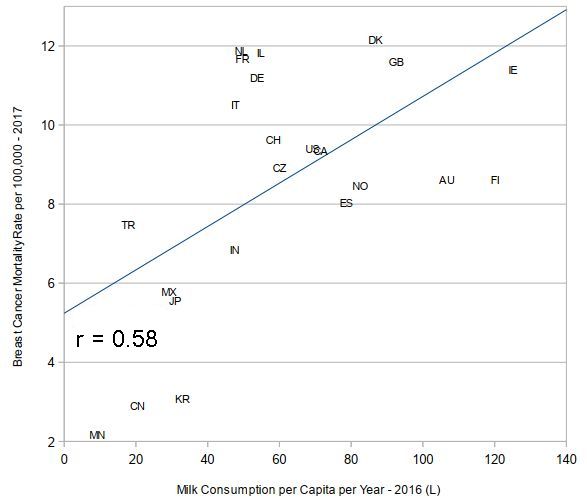Pink Day Blues
In 1985, National Breast Cancer Awareness Month (October) was created by the American Cancer Society. Funding was provided by Zeneca (later AstraZenca) , a British pharmaceutical company. AstraZenca is still (as at 2018) associated with Breast Cancer Awareness Month. AstraZenca produces Tamoxifen. Tamoxifen is an estrogen antagonist or anti-estrogen drug which works by blocking the effects of estrogen.
Pink Day is one day in October which is designated to create awareness of breast cancer and to raise money for research.
Lifetime exposure to estrogen is 2.5-3 times higher in Western women than rural Chinese women in the 1980s. 1 Chinese women reach menarche later, menopause earlier and have reduced levels of estrogen, progesterone and testosterone during their reproductive years.
There is much evidence that increased levels of estrogen, progesterone and testosterone are associated with a significant increase in breast cancer as well as evidence that low-fat, high carbohydrate diet reduces the level of these hormones. 2 3 4 5 6
The [WHO’s International Agency for Research on Cancer] Working Group classified consumption of processed meat as “carcinogenic to humans” and red meat as “probably carcinogenic to humans“. 7 Processed meat includes bacon, sausages and ham.
The [Australian] National Breast Cancer Foundation sells a recipe book, Cook 4 A Cure 8. Recipes include:
- Pork and Apple Bake
- Avocado, Mango and Bacon Salad
- Beef Koftas
- Citrus Glazed Ham
- Salmon Egg Rolls
- Pulled Pork Burgers (BBQ)
- Lamb Samosas (BBQ)
- Sweet, Salty Citrus Glazed Ham
- Cauliflower and Bacon Soup
There is a good correlation with the consumption of milk and breast cancer. This does not mean that milk causes breast cancer. However, a diet high in milk is often high in fat, saturated fat and animal protein. The graph shows “western” countries and a number of Asian countries. The diet in Asian countries has become more western in recent decades. 9 10
In the 1980s, China had a breast cancer rate of 20% of the US. The county with the highest breast cancer rate was 6.3 times greater than the lowest. In 2017, the breast cancer rate was 35% of the US. Despite the increase, it is still ranked 179 out of 183 countries. For ovarian cancer, it is ranked 175. 11

AU=Australia; CA=Canada; CH=Switzerland; CN=China; CZ=Czech Republic; DE=Germany; DK=Denmark; ES=Spain; FI=Finland; FR=France; GB=United Kingdom; IE=Ireland; IL=Israel; IN=India; IT=Italy; JP=Japan; KR=Korea, South; MN=Mongolia; MX=Mexico; NL=Netherlands; NO=Norway; TR=Turkey; US=United States
Walter Willet, the famed Harvard epidemiologist and former director of the Nurses’ Study stated in a New York Times interview,
Eric Rimm, another researcher from the Harvard School of Public Health, stated:
Related articles
Last updated on Tuesday 16 January 2024 at 07:51 by administrators
Footnotes
- Campbell, T. C. & Campbell, T. M. (2016) The China Study. Revised and Expanded Edition. Dallas, Texas: BenBella Books.
- Endogenous Hormones Breast Cancer Collaborative Group (2003) Body Mass Index, Serum Sex Hormones, and Breast Cancer Risk in Postmenopausal Women. JNCI Journal of the National Cancer Institute. 95 (16), 1218–1226.
- Boyd, N. F. et al. (1997) Effects of a low-fat high-carbohydrate diet on plasma sex hormones in premenopausal women: results from a randomized controlled trial. British Journal of Cancer. 76 (1), 127–135.
- Berrino, F. et al. (2001) Reducing Bioavailable Sex Hormones through a Comprehensive Change in Diet: the Diet and Androgens (DIANA) Randomized Trial. Cancer Epidemiology, Biomarkers & Prevention. 10 (1), 10.
- McTiernan, A. et al. (2003) Adiposity and Sex Hormones in Postmenopausal Breast Cancer Survivors. Journal of Clinical Oncology. 21 (10), 1961–1966.
- The Endogenous Hormones and Breast Cancer Collaborative Group (2002) Endogenous Sex Hormones and Breast Cancer in Postmenopausal Women: Reanalysis of Nine Prospective Studies. CancerSpectrum Knowledge Environment. 94 (8), 606–616.
- Bouvard, V. et al. (2015) Carcinogenicity of consumption of red and processed meat International Agency for Research on Cancer Monograph Working Group (ed.). The Lancet Oncology. 16 (16), 1599–1600.
- McCosker, K. (2012) Cook 4 A Cure. CreateSpace Independent Publishing Platform.
- World Life Expectancy (n.d.) World Life Expectancy – Statistics [online]. Available from: http://www.worldlifeexpectancy.com/
- Canadian Dairy Information Center (2016) Per Capita Global Consumption of Butter – Canadian Dairy Information Centre (CDIC) [online]. Available from: http://www.dairyinfo.gc.ca/index_e.php (Accessed 20 June 2018).
- World Life Expectancy (n.d.) World Life Expectancy – Statistics [online]. Available from: http://www.worldlifeexpectancy.com/
- Kolata, G. (1990) Animal Fat is Tied to Colon Cancer – New York Times [online]. Available from: http://www.nytimes.com/1990/12/13/us/animal-fat-is-tied-to-colon-cancer.html (Accessed 28 January 2017).
- Fox, M. (2002) Trans-fat increase cholesterol levels [online]. Available from: http://jawawa.id/index.php/newsitem/trans-fat-increase-cholesterol-levels-1447893297 (Accessed 29 March 2017).






